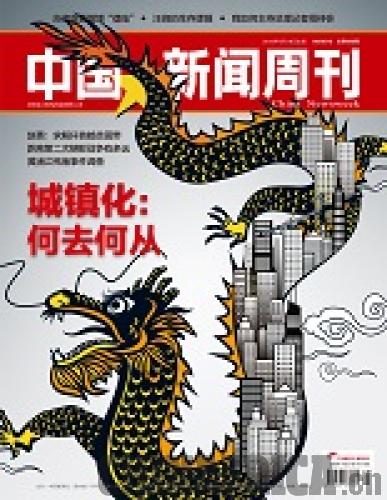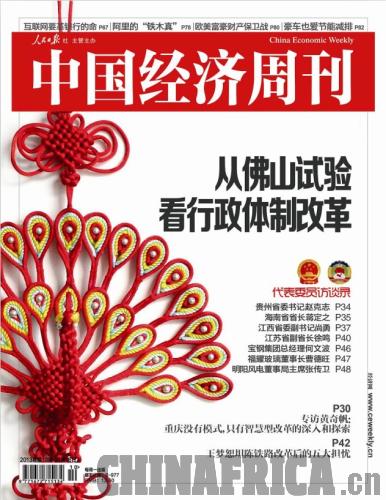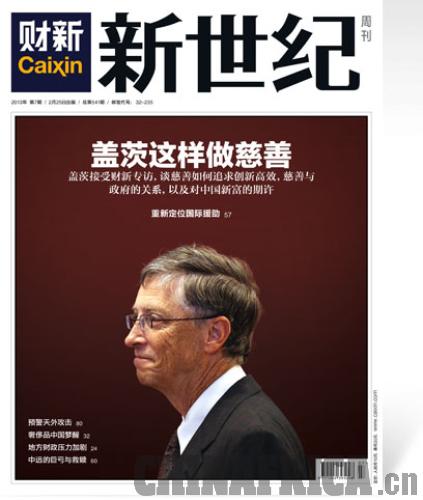| 
Problems in Urbanization
China Newsweek
March 14, 2013
Urbanization was one of the topics up for debate during this year's sessions of the National People's Congress and the Chinese People's Political Consultative Conference (lianghui in Chinese). This issue of China Newsweek looks at China's urbanization process and the problems emerging from it.
Against the backdrop of China's economic development, urbanization will effectively boost domestic demand and add more momentum for future increases. But the reality behind the positive statistics surrounding rapid urbanization is less optimistic. Most migrant workers are not absorbed by cities as they are not covered by urban social welfare, education and housing systems. Another problem is that migrant populations have crowded into metropolises like Beijing and Shanghai, increasing demand for limited resources.
Experts believe that merely residing in cities or working in construction, building city facilities, do not make for true urbanization. To become real urban residents, farmers must be entitled to the same status as other urban residents, and be able to enjoy all the public services offered in cities.

Transforming Functions
China Economic Weekly
March 18, 2013
Streamlining government organs is one way to promote government efficiency. At this year's lianghui, the Chinese Government initiated a new round of reforms to do just that.
According to China Economic Weekly, this round of reforms focuses on transforming government functions to build an efficient and transparent government with well-defined responsibilities and less corruption. After downsizing government departments, newly simplified administrative examination and approval procedures should be put in place to transform how the government functions, said Liu Yuelun, Mayor of Foshan in south China's Guangdong Province, a pilot for government organ streamlining.
Liu said he doesn't think the primary obstacles to reform will be that downsizing departments will be counter to officials' interests. The real problem is whether an efficient and law-based government with clear divisions of power and well-defined responsibilities can be set up, he noted, cautioning that reformers should avoid allowing a department's power re-expand after downsizing.
More Flexible Taxation Policy
Beijing Business Today
March 8, 2013
Responding to a public call to raise the individual income tax threshold, Song Lan, Vice Minister of the State Administration of Taxation, recently said that it is impossible to further raise the threshold at this time, as increasing it to 3,500 yuan ($562.8) in 2011 has already reduced the number of tax payers from 90 million to 30 million.
Is the 3,500 yuan threshold low? There is no single answer to this question because China is a vast country with imbalanced economic and social development across regions.
Thus, the threshold should be set by local governments according to local conditions, because establishing a single threshold that suits all provinces would be nearly impossible.

Prescriptions by Bill Gates
Caixin
February 25, 2013
On February 12, Caixin magazine interviewed Bill Gates in Mexico City. He talked about how to make charitable organizations more effective, and programs he has run in China.
As the founder and former CEO of Microsoft, Gates topped the Forbes rich list for 13 years from 1995 to 2007. The Bill & Melinda Gates Foundation is one of the largest private charity foundations. By December 2012, its total assets had reached $36.2 billion.
Since the foundation set up an office in China in 2007, it had invested more than $200 million in programs fighting HIV/AIDS and tuberculosis.
Talking about China's charity causes, Gates said the number of foundations is small, and that charities are still in their early developmental stages, with most programs focused on disaster relief. The government can effectively push forward charity by helping entrepreneurs establish organizations and offering tax incentives.
Adjusting Population Policy
Beijing Youth Daily
March 9, 2013
Premier Wen Jiabao said, in the government work report delivered at the First Session of the 12th National People's Congress, that China will stick to its family planning policy, but will work to improve its overall stance to suit the changes in China's demographics and promote long-term and balanced development.
The one-child policy came into being under particular historical conditions. As China's social and economic situations are now different, it is now time to adjust and improve the policy.
The shortcomings of the current population policy are increasingly obvious. For example, aging is serious issue. Additionally, the demographic dividend is disappearing, and many only children are developing personality problems. Families that have lost their only child are another pressing social problem. Slightly loosening the family planning policy will not lead to a population explosion, as proved by the fact that cities that have allowed couples to have a second child have seen no rebound in birth rates. |